Ares

The Council of the Gods by Cornelius van Poelenburgh (ca. 1630)
Mauritshuis, the HaguePublic DomainOverview
Ares, son of Zeus and Hera, was the god of the most brutal and unrestrained aspects of war. Though he was one of the Twelve Olympians, his fellow gods had little love for him.
In myth, Ares was characterized by his cruelty and insatiable taste for bloodshed. He also created chaos and discord off the battlefield. In one myth, Ares was the lover of his brother Hephaestus’ wife Aphrodite—an affair that led to much animosity among the gods.
Key Facts
Who were Ares’ parents?
Ares was the son of Zeus, the supreme god of the Greeks, and Hera, goddess of women and marriage. His siblings included Eileithyia, goddess of childbirth; Hebe, goddess of youth; and Hephaestus, god of the forge and craftsmanship.
Though Ares was devoted to his mother Hera, there was no love lost between him and his father Zeus. Zeus scorned Ares for his violent and cruel nature, even telling him at one point that he was the most hateful of all the gods.
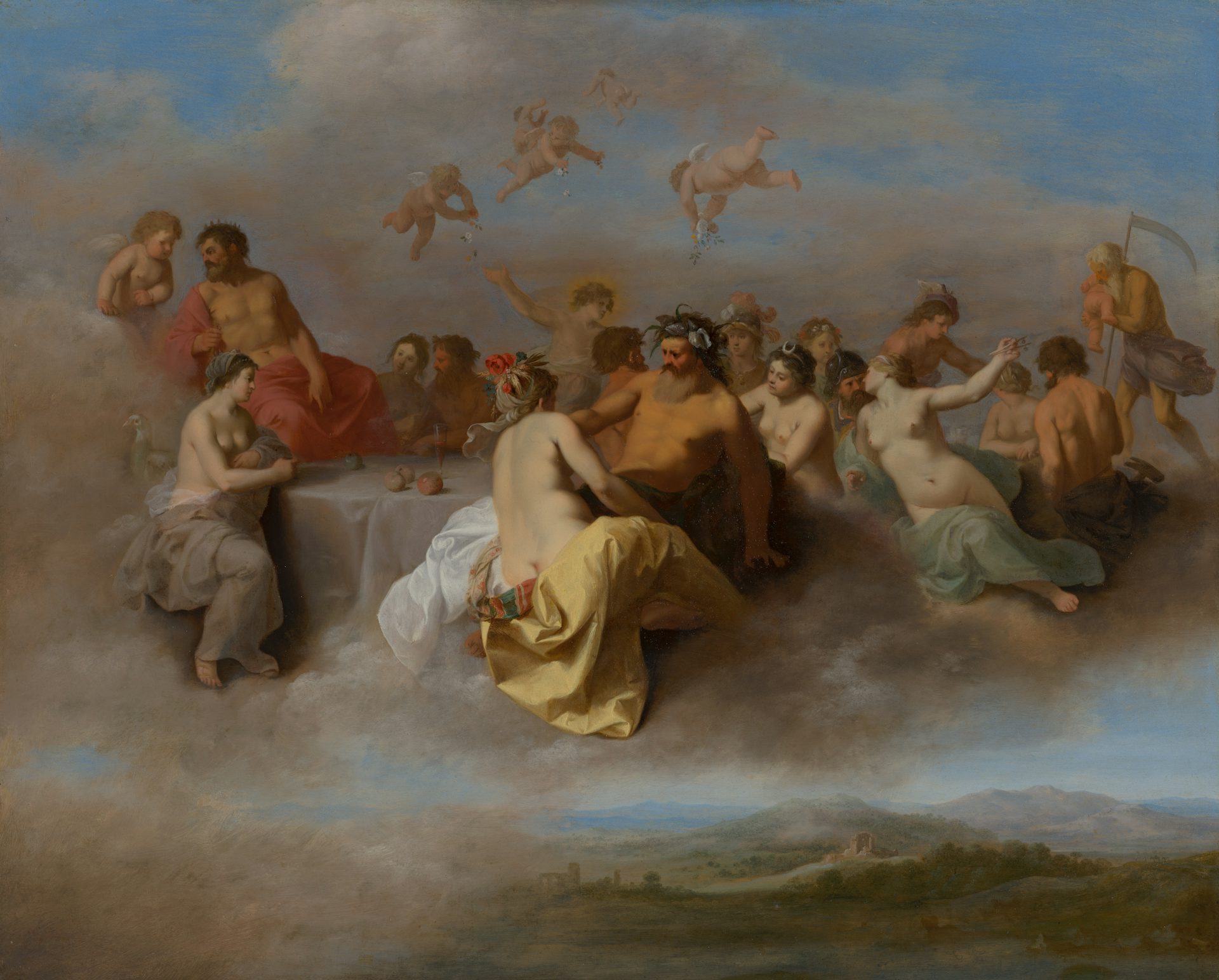
The Council of the Gods by Cornelius van Poelenburgh (ca. 1630)
Mauritshuis, the HaguePublic DomainWhat were Ares’ attributes?
Ares was often represented as a warrior in armor, with helmet, shield, and spear. In battle, he was accompanied by several terrifying attendants, including Deimos and Phobos—the personifications of panic and fear, respectively—and the war goddess Enyo.
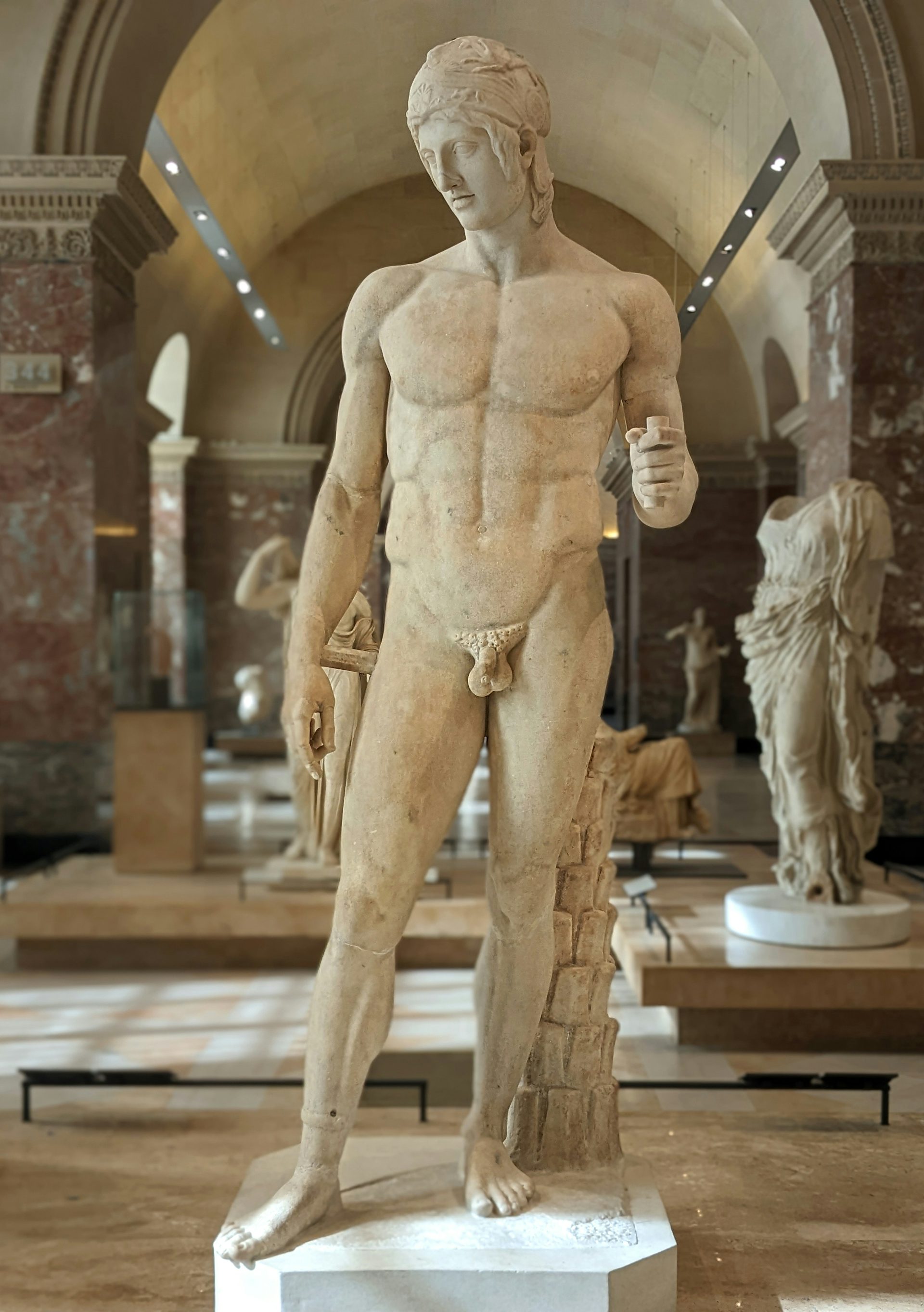
The "Borghese Ares," a 2nd-century Roman sculpture after a Greek original
Louvre Museum, Paris / ShonagonCC0Ares, Aphrodite, and Hephaestus
Ares had a longstanding affair with Aphrodite, the goddess of love and sex, even though she was married to Ares’ brother Hephaestus. Upon learning of the affair, Hephaestus resolved to punish his wife and her lover. He fashioned a net so fine that it was invisible to the naked eye and laid it over his bed; the next time Ares and Aphrodite made love, they were caught fast in the trap.
Hephaestus invited all the other gods to laugh at Ares and Aphrodite, helplessly ensnared in his net. When he finally let them go, Ares and Aphrodite slunk away, thoroughly humiliated.
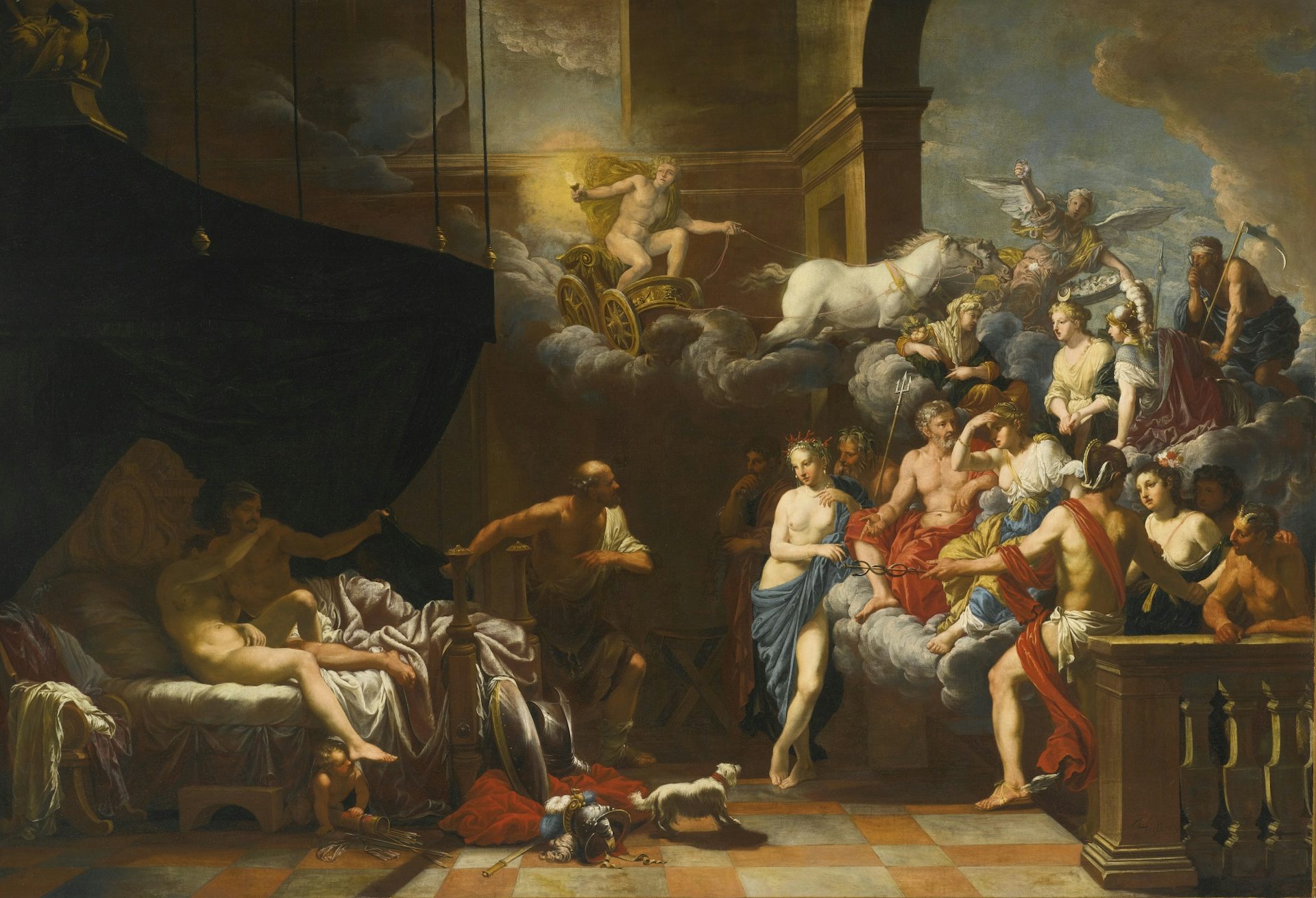
Vulcan Surprising Venus and Mars in Bed before an Assembly of the Gods by Johann Heiss (1679)
Wikimedia CommonsPublic DomainEtymology
The earliest reference to the name “Ares” dates back to the Mycenaean Period (ca. 1500–1200 BCE), where it shows up in the syllabic Linear B script as a-re. The origins of the name are disputed. The most straightforward etymology derives it from the word arē or ara, which in ancient Greek means “bane,” “ruin,” “curse” and/or “imprecation.” But the name Ares may also come from another Greek word, aros, which means “profit” or “help.”[1]
Modern scholars have increasingly searched beyond Greek for the origins of Ares’ name. Some, for example, have linked the name to Indo-European roots, such as yōris or yāris (a word connoting violence), as well as the Sanskrit word irasyā (meaning “malevolence”).[2]
Linguist Robert S. P. Beekes, meanwhile, questioned all previous etymologies and instead proposed a pre-Greek, non-Indo-European origin.[3]
Pronunciation
English
Greek
Ares Ἄρης Phonetic
IPA
[AIR-eez] /ˈɛər iz/
Other Names
From the earliest period of Greek history, Ares was also called Enyalios, “the warlike one.”
Epithets
Ares’ epithets generally stressed his warlike and brutal nature. In addition to Enyalios, which functioned more like an alternative name for the god, Ares’ major epithets included Andreiphontēs (“man-slaying”), Chalceos (“brazen”), Ochys (“piercing”), Thoos (“swift”), Thouros (“furious”), and Thēritas (“beast-like”).
In ancient Greek, “Ares” was very often used to mean simply “war.” The adjective form of Ares’ name—areios (masculine) or areia (feminine)—was sometimes used as an epithet for other gods either associated with war (like Athena) or with Ares himself (like Aphrodite).
Attributes
Domains
Ares was the god of war and violence. More specifically, he was associated with “the most objectionable aspects of war”[4]—with violence and conflict for its own sake. Unlike his counterpart, the war goddess Athena, Ares did not represent strategy or heroic ethics; rather, he embodied the destructive and cruel side of war.
Due to these negative qualities, the Greeks sometimes called Ares a Thracian rather than a god in an attempt to disassociate him from Greek society and values. (Thrace was a region north of Greece, home to a notoriously warlike people.)[5]
Conversely, Ares’ Roman counterpart, Mars, was seen in a much more positive light, as the ancestor of Rome and one of the chief gods of the Roman pantheon.
Iconography
Ares’ signature attributes were his tall, plumed helmet, his weapons, and sometimes a breastplate and shield. His depiction in art and literature evolved somewhat throughout Greek history. In early, archaic art (ca. 800–490 BCE), Ares was generally bearded and fully armed. By the classical period (ca. 490–323 BCE), he was increasingly shown as clean-shaven and sometimes nude, perhaps carrying his helmet or holding only a spear.
In literature, Ares remained somewhat more consistent. The Greeks always dreaded Ares as the cruel and unsympathetic god of the chaotic side of war, a lover of death for its own sake. In Homer, Ares goes to war attended by his sons Deimos and Phobos (the personification of terror and fear, respectively) as well as his sister Eris (called Enyo by Hesiod), a goddess of discord, hate, and violence.[6]
In later sources, Enyalios evolved from being just another name for Ares to the name of his son (by Enyo).[7] Ares was also associated with other terrible beings, such as Cydoemus (the personification of “battle din”), the Machae (“battles”), Polemos (“war”), and Alala (“war cry”).
Symbols
Ares was associated with a number of animals, including the boar, the dog, and certain birds. He was linked especially closely to the vulture and a few species of owl whose flights were read as portents of war, discord, and bad fortune.
In mythology, Ares’ most famous creatures were the Colchian Dragon, who guarded the Golden Fleece, and the Ismenian Dragon, who guarded a sacred spring in Thebes until it was killed by Cadmus.
Family
Family Tree
Mythology
Ares and the Olympians
Though a son of Zeus and Hera, the king and queen of the gods, Ares was just as unpopular among the Olympians as he was among the Greeks. In a famous scene from the Iliad, Ares returns from battle, groaning and whining about his injuries. But this empty bid for pity does not work on Zeus, who loses patience and tells Ares, for all to hear:
Most hateful to me art thou of all gods that hold Olympus, for ever is strife dear to thee and wars and fightings. Thou hast the unbearable, unyielding spirit of thy mother, even of Hera; her can I scarce control by my words.[27]
Ares was usually selfish and cruel, but he would rise up to defend his mother, Hera, from Zeus and the other gods. In one tradition, for example, it was Ares who forced Hephaestus to free Hera after he had bound her in a magical chair.[28] In another story, Hera was jealous of Leto when Zeus impregnated her with Apollo and Artemis, so she sent Ares to make sure that Leto was driven away from every land in her search for a place to give birth.[29]
Ares and Aphrodite
Though hated by most of the gods, Ares did have the love and favor of Aphrodite, goddess of beauty and erotic love. Aphrodite was married to Hephaestus, but she much preferred the handsome and strong Ares to the crippled and disfigured smith god.
Possibly the most famous myth involving Ares, colorfully narrated in the Odyssey, relates to his affair with Aphrodite.[30] One day, the sun god Helios happened to observe Ares and Aphrodite having sex in Hephaestus’ bed. Helios rushed away to tell Hephaestus, and the crafty husband soon conjured up a scheme to ensnare the two.
Using his great skill, Hephaestus fashioned a net so fine it was essentially invisible and placed it in his bed. The next time Ares and Aphrodite were enjoying each other’s company, Hephaestus sprang his trap, catching the two in the act.
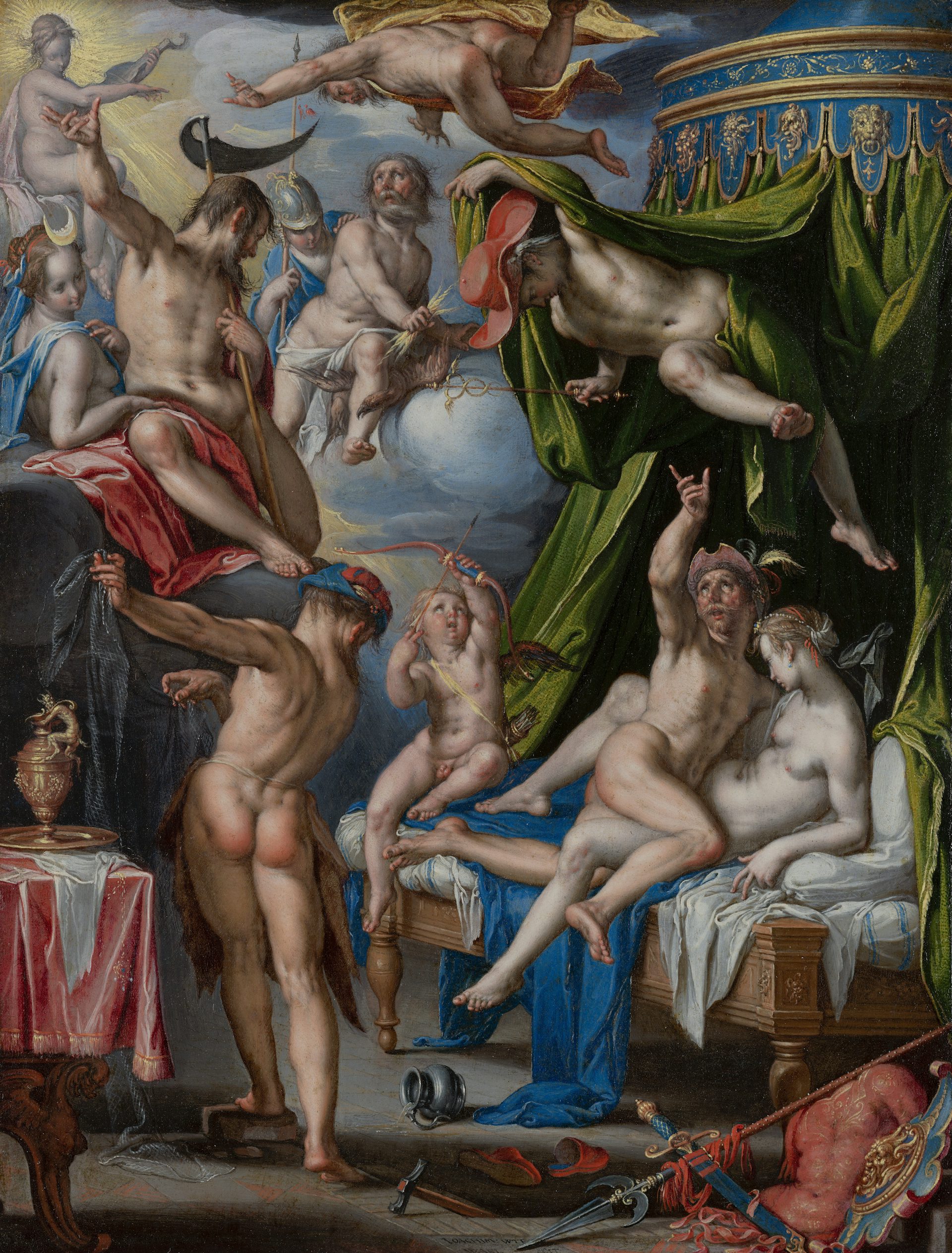
Mars and Venus Surprised by Vulcan by Dutch painter Joachim Wtewael (1601). Vulcan (Hephaestus), standing at left showing his back, has gathered other gods to witness and shame Mars (Ares) and Venus (Aphrodite) in an adulterous act.
MauritshuisPublic DomainAdding insult to injury, Hephaestus invited the entire pantheon to witness what he had found. While the goddesses refused to come, claiming modesty, the male gods eagerly attended and laughed heartily when they saw what Hephaestus had to show them. Poseidon alone sympathized with the humiliated Ares and pleaded with Hephaestus to release him.
Ares and Aphrodite were famously jealous and sometimes unjustly punished their rival lovers. For example, after Ares slept with Eos, the goddess of dawn, Aphrodite cursed Eos to be forever in love with someone else.[31] And when Aphrodite fell in love with Adonis, Ares turned himself into a boar and gored the young man to death.[32]
Ares and the Foundation of Thebes
Ares played a role in the foundation of the city of Thebes, a warlike city-state that enjoyed a brief period of dominance in the fourth century BCE, prior to the rise of Macedon. It was said that Ares created a water dragon to terrorize the people who lived near the future site of Thebes. This dragon, which lived by the river Ismenus and was thus called the Ismenian Dragon, was sometimes said to have been Ares’ own offspring.[33]
One day, a great hero of Greek mythology, Cadmus, killed the dragon. He then sowed its teeth in the earth, causing the men known as the Spartoi (“sown men”) to emerge. These men immediately began killing one another in a vicious battle, but the five survivors helped Cadmus found Thebes and became the ancestors of the city’s most important families.
Ares, however, was angry that Cadmus had killed his dragon. To repent, Cadmus served Ares for eight years. In return for this service, Ares gave Cadmus the hand of his daughter Harmonia in marriage.[34]
Ares in the Trojan War
During the Trojan War, the impetuous, capricious, and belligerent Ares was unique among the gods in not consistently siding with either the Greeks or the Trojans. Instead, he alternately fought on both sides. In the Homeric epics, where he generally favored the Trojans, Ares was described as “hateful,” “war glutton,” “killer of men,” and “curse of men." Tellingly, he was also depicted as a rather incapable warrior.
During one battle, while Ares was defending the Trojans, Athena imbued the Greek hero Diomedes with preternatural strength and courage. Diomedes used these gifts to run Ares through with a spear.[35] Homer’s unflattering description of the wounded Ares says much about the god’s standing: Ares allegedly slithered away to Olympus, only to be mercilessly berated by his father, Zeus.
Soon after this, Zeus forbade the gods from entering the battle at Troy. But when Ares heard that his son Ascalaphus had been killed by the Trojans, he made ready to disobey Zeus and fight on the Greek side. Only Athena was able to stop him.[36]
Later, when Zeus permitted the gods to take part in the fighting at Troy again, Ares wanted to take revenge on Athena for helping Diomedes injure him. During their battle, Athena managed to get the better of Ares by throwing a boulder at him.[37]
Ares, the Luckless God
Ares and Heracles
Ares had two sons named Cycnus, both of whom had confrontational run-ins with the great Heracles. The first (and more famous) Cycnus was the son of Ares and Pelopia and lived somewhere in Thessaly (in northern Greece).[38] According to some versions, Cycnus would kill all travelers he met, with the intention of using their skulls to build a temple to his father, Ares.[39] Despite (or perhaps because of) his son’s violent nature, Ares loved him.
In some traditions, Heracles was commissioned to slay Cycnus; for example, in a short poem called the Shield of Heracles (traditionally attributed to Hesiod), Apollo ordered the murder.[40] In other traditions, it was Cycnus who challenged Heracles.[41]
After Heracles had killed Cycnus, Ares flew into a rage. The god of war confronted Heracles in battle, and might have won had Athena not defended Heracles. Athena warned Ares to check himself, but he would not listen. Hesiod paints a vivid picture of the scene:
Then bitter grief seized Ares and he drew his keen sword and leaped upon bold-hearted Heracles. But as he came on, the son of Amphitryon, unsated of fierce battle, shrewdly wounded his thigh where it was exposed under his richly-wrought shield, and tare [sic] deep into his flesh with the spear-thrust and cast him flat upon the ground.[42]
Ultimately, Ares needed to be saved by his attendants Deimos and Phobos, leaving the battle with nothing but an injured body and wounded pride. To the Greeks who absorbed these tales of Ares’ embarrassing losses, the lesson was obvious: the calculated strategy of Athena would always overcome the blind rage of Ares.
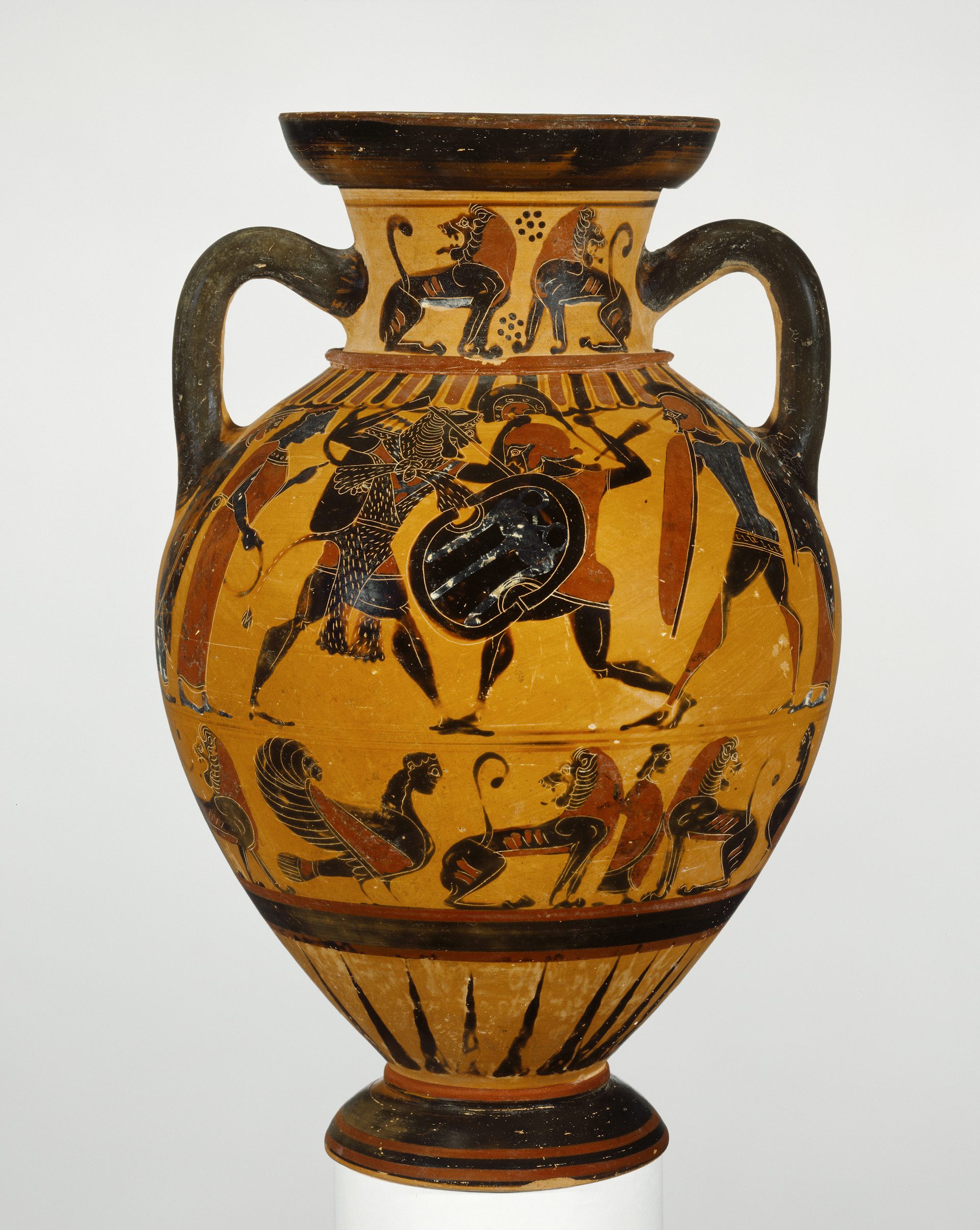
Ares, at far right, backs up his son Cycnus, depicted in battle with Hercules on this Greek terracotta jar (ca. 570 BCE).
The J. Paul Getty MuseumPublic DomainThe second Cycnus was the son of Ares and Pyrene and lived in Macedon. He also fought Heracles and was even assisted by his father. In the best-known tradition, however, this battle seems to have ended indecisively when Zeus separated the fighters with a thunderbolt.[43]
Ares pitted himself against Heracles on at least one further occasion, during a battle in the Greek city of Pylos. However, little is known of this confrontation aside from the fact that Ares, as usual, was defeated and gravely wounded.[44]
The Aloadae
In another tale of defeat, Ares went up against the Aloadae, Otus and Ephialtes, two gigantic sons of Poseidon and Iphimedia. In most traditions, the Aloadae planned to abduct Artemis and Hera, but decided that they must first remove Ares from the picture. Otus and Ephialtes captured the god of war and stuffed him into a bronze chest, keeping him there for an entire lunar year (thirteen months). Ares only managed to escape through the help of Hermes.[45]
The Areopagus
Though virtually all the Greek gods routinely killed, raped, and pillaged, Ares was one of the few who got into trouble for his misdeeds. There was a myth in which Poseidon’s son Halirrhothius attempted to violate Ares’ daughter Alcippe. In one of his more justified acts of aggression, Ares killed Halirrhothius. Poseidon, however, took Ares to task and had him tried for murder in the city of Athens.
In the end, Ares was acquitted by the Twelve Olympians. The site of his trial was thereafter called the Areopagus, meaning “hill of Ares,” and was where the Athenians tried homicide cases (and a handful of other criminal cases) throughout their history.[46]
Other Myths
Many other myths emphasize Ares’ misfortunes or his general helplessness. In one myth, Typhoeus defeated Zeus in their first battle, and Ares was forced to go into hiding along with the rest of the gods. To avoid detection, he turned himself into a fish.[47] In another myth, whose details unfortunately no longer survive, Ares was forced to be a slave to a mortal, a punishment which had also been given to other gods like Apollo and Poseidon.[48]
Ares and the Greeks
For the Greek majority that idealized restraint above aggression, Ares stood as a warning against the dangers of unchecked passion and thoughtless action. Tellingly, Ares had followings among the Spartans and Thebans, warriors renowned not just for their skill and aggression, but also for their eager glorification of war.
Worship
Festivals
We know of only a handful of festivals and celebrations honoring Ares in the ancient world. At Geronthrae, a town in Laconia, there was an annual festival dedicated to him which barred women.[50] At Tegea, on the other hand, there was a festival that was celebrated only by women from which men were barred: this festival, honoring Ares Gynaecothenas (“Ares feasted by women”), commemorated a war between Tegea and Sparta that ended after the Tegean women beat the Spartans in a bold ambush.[51]
Aside from these two festivals, not much can be said about how Ares was worshipped in ancient Greece. It does appear that soldiers and armies sacrificed to him before battle sometimes. And at Sparta, there was a strange tradition in which young men would sacrifice puppies to Ares under the name Enyalios in preparation for certain fighting contests.[52]
Consistent with their representation of the brutal Ares as “Thracian,” the Greeks associated worship of the war god with their “barbarian” neighbors to the north. The historian Herodotus, for example, claimed that in the region of Scythia, Ares was represented as a great sword; when a Scythian tribe won a battle, they sacrificed every hundredth prisoner before this sword.[53]
Temples
Temples of Ares were usually built outside of the main town, likely representing the idea that the god prevented enemies from coming too close. In his sacred spaces, Ares was often worshipped in partnership with other gods, especially his mythological lover Aphrodite.
Ares had important temples dedicated to him at Athens, where he was honored with a cult statue made by Alcamenes,[54] and at Sparta, where a statue of the god in chains apparently conveyed the message that military might would never leave the city.[55]
Ares also had temples at Geronthrae;[56] Tegea;[57] Olympia, where the Olympic Games were held;[58] Thebes, where he was worshipped together with Aphrodite;[59] Megalopolis, where he was also worshipped with Aphrodite;[60] Hermione;[61] and Troezen.[62]
In Rome, Ares was conflated with Mars, the god who was often called the ancestor of the Roman people. Unlike Ares, Mars was quite popular among his worshippers. At the end of the first century BCE, for example, the Roman emperor Augustus built the lavish temple of Mars Ultor (“Mars the Avenger”) in Rome.
Pop Culture
In recent years, Ares has seen a resurgence in popular culture. While he has maintained much of his belligerence, he has also been reinvented as a diabolical plotter working to achieve sinister aims.
Ares is featured prominently in the video game series God of War, serving as the main antagonist and final boss in the first installment. In the game’s story, Ares assails Athens until Kratos, his former protégé, rescues the beleaguered city.
In addition to an appearance in Disney’s Hercules (1997), Ares has enjoyed prominent roles in the television series Xena: Warrior Princess and Hercules: The Legendary Journeys (both 1990s), where he is portrayed by Kevin Tod Smith. In Xena, Ares comically balances his love for Xena with an irrepressible tendency to foment violence and hatred in others. Ares is also one of the main villains of the Percy Jackson and the Olympians book series, written by Rick Riordan.
Finally, Ares appears as the principal antagonist in the blockbuster movie Wonder Woman (2017), starring Gal Gadot as the titular Wonder Woman and David Thewlis as Patrick Morgan, the assumed persona of Ares, a politician on the British Supreme War Council who ironically pushes to end the hostilities in World War I.
In Wonder Woman, Ares is a nefarious being who silently persuades others to commit atrocities (including aerial bombardments and attacks with chemical weapons, among others). In doing so, he quietly produces the horrors of the First World War. His portrayal as a plotter working behind the scenes is a vast departure from his ancient role as a brash and uninhibited brawler.